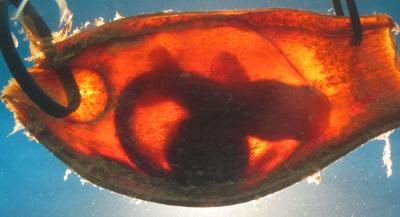Baby Sharks Detect Electrical Fields of Predators, Freeze in Response

Baby sharks, while still in egg cases, can sense electric field of the predators and stay still to avoid being eaten. Researchers say the discovery can help develop effective shark repellent.
The study was conducted by researchers at University of Western Australia and is published in the journal PLOS ONE. Researchers found that while adult sharks are known to use highly sensitive receptors to detect electric fields of their prey, even embryonic sharks can sense electric field and then reduce movement to avoid being detected.
Certain shark species deposit their embryos in rectangular cases that are called devils purses. These sacs have tendrils that help them stay attached to the ground.
The study was conducted on 11 brownbanded bamboo shark (Chiloscyllium punctatum) embryos. Researchers tested reactions of the embryos by subjecting them to weak electrical field of a predator..
"Despite being confined to a very small space within an egg case where they are vulnerable to predators, embryonic sharks are able to recognise dangerous stimuli and react with an innate avoidance response. This knowledge may help us to develop effective shark repellents," said Ryan Kempster, marine neuroecologist and lead author of the study, according to a news release.
Kempster also found that shark babies not only responded to electric signals but also remembered the signals if they were presented within 40 minutes. The second exposure to the same electric field signal elicited lower response from the shark babies. This is an important finding as it will help develop new shark repellants.
"So if you were using a shark repellent, you would need to change the current over a 20- to 30-minute period so the shark doesn't get used to that field," Kempster told the National Geographic. He added that better shark repellents will keep humans as well as sharks safe.



























